|
The Hellenic Genocide
Quotes from historical documents and related Photos. |
|||
CHAPTER XVII: "The looting and murder went on steadily under our eyes—a murdered man lay before our Murray house door for days, under the American flag, his blood spattered over our steps, etc. There were dead and dying every where. The silence of death finally reigned over us and was broken during the last three days only by the fierce Chetas breaking in doors of houses, shooting the poor cowering inhabitants, looting, etc." CHAPTER XVII: "After the third day of the occupation of Khemal’s army, fires began to break out in the Christian quarter of the city. Miss Mills and some of our teachers saw soldiers preparing fires. I myself saw a Cheta carrying a load of firewood on his back up an alley, from which later on the fire that caught our building came." "It is quite clear in my mind that there was a definite plan to burn out the Christian quarter after it had been looted. The time for starting the great fire was when the wind was blowing away from the Turkish quarter. I remarked when the fires began."" CHAPTER XVII: ""I am sure the Turkish authorities will say one of two things, either that the retreating Greek army set the city onfire, or the Armenians." "Exactly this has been published in Italian and French papers. Do not believe a word of it! We were in the Christian quarter where the fires began. Almost all Armenians except those we were sheltering had been looted and killed a day or two—even longer— before any fires began. The Greek soldiers had passed quietly through the suburbs about three or four days before." "The whole city had been completely under military control since Saturday afternoon and the fires began on Wednesday, which finally destroyed the city. The Turks, Chetas or regulars, or both, burned the city to dispose of the dead after having carried away their loot."" CHAPTER XVII: "The torch was applied to that ill-fated city and it was all systematically burned by the soldiers of Mustapha Khemal in order to exterminate Christianity in Asia Minor and to render it impossible for the Christians to return." CHAPTER XVII: "The aged Doctor Arghyropolos, long a well-known figure on the streets of Smyrna, being ill, was brought down on a stretcher to the quay where he died. The last Miltonic touch was now added to a scene of vast, unparalleled horror and human suffering. These thousands were crowded on a narrow street between the burning city and the deep waters of the bay." CHAPTER XVII: "As the destroyer moved away from the fearful scene and darkness descended, the flames, raging now over a vast area, grew brighter and brighter, presenting a scene of awful and sinister beauty. Historians and archeologists have declared that they know of but one event in the annals of the world which can equal in savagery, extent and all the elements of horror, cruelty and human suffering, the destruction of Smyrna and its Christian population by the Turks, and this was the demolition of Carthage by the Romans." CHAPTER XVII: "Certainly at Smyrna, nothing was lacking in the way of atrocity, lust, cruelty and all that fury of human passion which, given their full play, degrade the human race to a level lower than the vilest and cruelest of beasts. For during all this diabolical drama the Turks robbed and raped. Even the raping can be understood as an impulse of nature, irresistible perhaps, when passions are running wild among a people of low mentality and less civilization, but the repeated robbing of women and girls can be attributed neither to religious frenzy nor to animal passions. One of the keenest impressions, which I brought away with me from Smyrna was a feeling of shame that I belonged to the human race." CHAPTER XVII: "The Turks were glutting freely their racial and religious lust for slaughter, rape and plunder within a stone’s throw of the Allied and American battle-ships because they had been systematically led to believe that they would not be interfered with. A united order from the commanders or from any two of them—one harmless shell thrown across the Turkish quarter—would have brought the Turks to their senses." CHAPTER XIX: "American relief workers, standing on the deck of a ship, which left Smyrna soon after the Simpson, related that they saw a man throw himself into the sea and swim toward the vessel. A Turkish soldier raised his rifle, took aim and blew the man’s head off. Another American, in relating the same incident to me, added the detail that the Turk pointed his rifle over the shoulder of a British Marine. Teachers and others of the American Girls’ school told me that they saw a lady who resided in the house directly across the street standing in the road surrounded by Turkish soldiers, who were robbing her and tearing the rings from her fingers. When they finished, one of them stepped back and cut one of her hands off with his sword. The lady was never seen again and doubtless died as the result of her injuries." The Hellenic Genocide Quotes from historical documents and related Photos. Previous page | Initial page | Site Map | Next page (23rd of 29) |
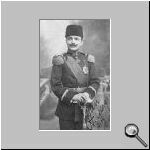
Enver Pasha, Minister of War. A leader of the Young Turks.
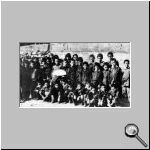
Assyrian orphans in Eastern Turkey.
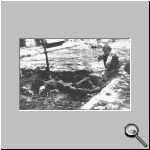
Christian children. Dead and left to die.
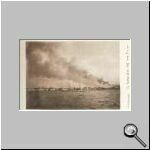
Smyrna on fire.
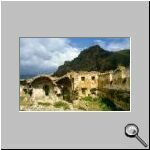
Remains of an Hellenic school in Pontos.
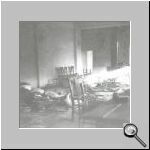
The destroyed office of the Church of Evangelistrias.
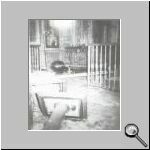
Destruction of the interior of Church of Zoodochos.
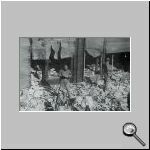
Tukish soldiers plundered Hellenic houses and shops.
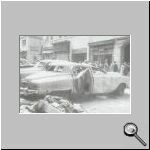
Cars of Hellenes destroyed by the Turkish mob.
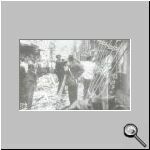
Destruction and looting of Hellenic shops. The next day.